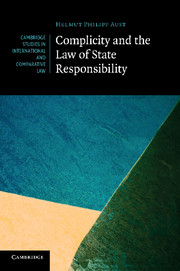Book contents
- Frontmatter
- Contents
- Foreword
- Preface
- Table of cases
- Abbreviations
- 1 Introduction
- 2 Complicity between bilateralism and community interest
- 3 Complicity and the international rule of law
- 4 Complicity in customary international law
- 5 The concept of complicity in Article 16 ASR
- 6 The consequences of complicity
- 7 Complicity and aggravated responsibility
- 8 A network of rules on complicity
- General conclusions
- Bibliography
- Index
7 - Complicity and aggravated responsibility
Published online by Cambridge University Press: 07 September 2011
- Frontmatter
- Contents
- Foreword
- Preface
- Table of cases
- Abbreviations
- 1 Introduction
- 2 Complicity between bilateralism and community interest
- 3 Complicity and the international rule of law
- 4 Complicity in customary international law
- 5 The concept of complicity in Article 16 ASR
- 6 The consequences of complicity
- 7 Complicity and aggravated responsibility
- 8 A network of rules on complicity
- General conclusions
- Bibliography
- Index
Summary
Introductory remarks
Ever since its inception in Articles 53 and 64 of the Vienna Convention on the Law of Treaties, the concept of jus cogens has puzzled legal commentators with respect to its possible ramifications beyond the law of treaties. Together with its conceptual sibling, obligations erga omnes, its existence has pointed to the need for coining forms of graded responsibility. The expectation was that the coming into existence of these forms of international public order could not leave unaffected what, through the work of the ILC, turned into a central element for the enforcement of international law. As is the case with respect to other elements of the law of State responsibility, the question arises how the problem of complicity is affected by the categories of peremptory norms and obligations erga omnes. In Chapter 2, we discussed the extent to which these categories have helped to overcome the bilateral mindset which used to pervade the law of State responsibility. However, we have also found that it would strain this analysis to deduce straight consequences for the issue of complicity from these findings. Accordingly, a more detailed analysis is called for as it is not only the case that these important elements of international public order may have played a role in paving the way towards the recognition that complicity in the commission of internationally wrongful acts is no longer acceptable; they may also call for different consequences in the cases in which complicity in the violation of peremptory norms is at stake.
Given that the regime of ‘aggravated responsibility’ has been described in detail in manifold ways, only a short overview of its development will be given in the next section (section 2). Following that, the impact of the rules on aggravated responsibility on the problem of complicity will be considered, which will involve a discussion of Articles 40 and 41 ASR (section 3), the relationship between complicity and obligations of cooperation in the law of State responsibility (section 4) as well as their relation to countermeasures in the collective interest (section 5).
- Type
- Chapter
- Information
- Complicity and the Law of State Responsibility , pp. 319 - 375Publisher: Cambridge University PressPrint publication year: 2011
- 1
- Cited by



